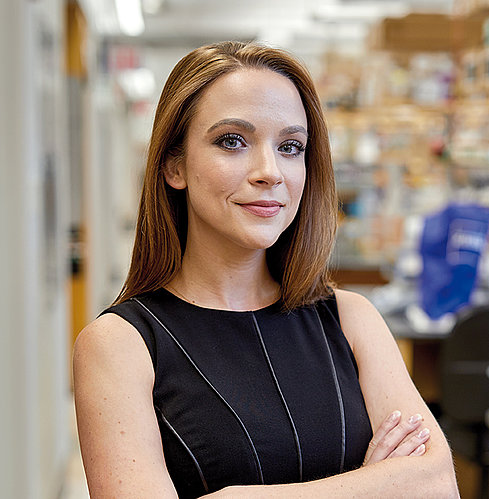2019 Winner Lauren Orefice, Ph.D., Massachusetts General Hospital & Harvard Medical School

Lauren Orefice received her B.S. in Biology from Boston College and her Ph.D. in Neuroscience from Georgetown University, where she studied the role of local BDNF synthesis in dendritic spine morphogenesis under the mentorship of Dr. Baoji Xu. For her postdoctoral work, Lauren joined Dr. David Ginty’s Lab at Harvard Medical School and focused on understanding somatosensory alterations in mouse models of autism spectrum disorders (ASD). Her work has identified that peripheral somatosensory neurons, outside the brain, are dysfunctional in multiple mouse models of ASD and contribute to the development of some of the major, core symptoms of ASD. In January 2019, Lauren started as an Assistant Professor in the Department of Molecular Biology at Massachusetts General Hospital and the Department of Genetics at Harvard Medical School. Her lab studies the development and function of somatosensory circuits, and how somatosensation is altered in developmental disorders.
Outside-in: Rethinking the etiology of autism spectrum disorders
Autism spectrum disorders (ASDs) are highly prevalent neurodevelopmental disorders defined by impairments in social communication and interactions as well as restricted, repetitive behaviors. While ASDs are heterogeneous in etiology and severity, the vast majority of individuals with ASD also exhibit a complicated array of co-morbid symptoms, including aberrant reactivity to light touch. Dr. Lauren Orefice, under the mentorship of Dr. David Ginty, aimed to define the etiology of touch over-reactivity in ASD. She found that genetic mutations only in peripheral sensory neurons, and not neurons in the brain, account for touch over-reactivity in ASD mouse models. Her work identified that touch over-reactivity due to peripheral sensory neuron dysfunction contributes to aberrant brain development, as well as anxiety-like behaviors and social interaction deficits in multiple mouse models. Dr. Orefice also found that selective restoration of peripheral sensory neuron function improves touch over-reactivity, cortical development, anxiety-like behaviors, and some social deficits in mice. Dr. Orefice’s work has revealed a novel locus of dysfunction in ASD and how aberrant function in peripheral sensory neurons can link multiple ASD phenotypes, leading to the exciting possibility of a therapeutic target.
For Lauren Orefice’s full essay, see Science online at sciencemag.org
2019 Finalists
András Szőnyi, M.D., Ph.D.
Zvonimir Vrselja, M.D., Ph.D.
